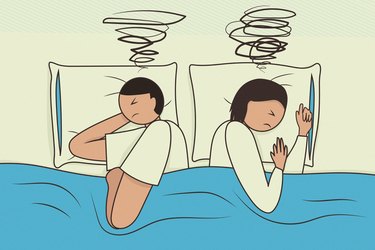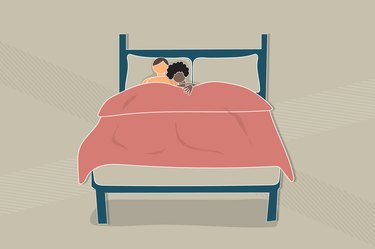
One of the old adages you've probably grown up with is "never go to bed angry." But the reality is, you can't just snap your fingers and poof! watch all that rage and frustration you feel vanish.
Here's a closer look at how going to bed angry effects both your physical and emotional health.
Video of the Day
Video of the Day
What Happens if You Go to Bed Angry?
You Likely Won't Get a Good Night's Rest
People who struggle with anger control get worse sleep, per a December 2017 study published in the Journal of Research in Personality.
"Anger is an emotion that nine times out of ten increases your heart rate and it's almost impossible to fall asleep with a heart rate above sixty," says Michael Breus, PhD, a sleep psychologist in Los Angeles and author of Energize! Go From Dragging Ass to Kicking It in 30 Days.
Unfortunately, if you get a poor night's sleep, it may make matters worse the next day.
A poor night of sleep is associated with more frequent and severe conflict in couples, per an older May 2013 study published in Social Psychological and Personality Science. Those who said they slept poorly the night before had more unwanted thoughts and were less able to take their partner's perspective during follow-up conversations. They were also less likely to resolve conflict.
"If you're sleep-deprived, you're like a ticking time bomb," Breus explains. "You're more likely to fly off of the handle, because lack of sleep clouds your judgement and you'll less likely to slow down and think things through."
Your Anger May Grow Overnight
If you take anger to bed, you can dwell on it, which may cause it to morph into an even bigger issue, notes Sheenah Hankin, PhD, a psychotherapist in Naples, Florida, and author of Complete Confidence.
While you sleep, your brain reorganizes the way it stores negative memories, according to a November 2016 study published in the journal Nature Communications. Instead of mainly storing them in your brain's memory center — the hippocampus — they diffuse them around your brain's cortex. The result? You're more likely to recall them in the future.
It's Hard on Your Overall Health
When you're upset, your body churns out stress hormones such as cortisol, adrenaline and norepinephrine, Breus says. These chemicals all increase your blood pressure, and you may notice the effects even when you're asleep.
In fact, an April 2020 study published in the International Journal of Environmental Research and Public Health found that people who go to bed angry may be less likely to experience the natural blood pressure dips that occur with sleep.
The Consequences of Continuing to Fight
But while you might not want to go to bed angry, you also don't want to keep fighting, either.
"When your heart rate rises to over 100 beats per minute, you lose access to the part of your brain capable of complex reasoning," explains Laura Silverstein, LCSW, a certified couple's therapist in Philadelphia and author of Love Is an Action Verb. "When heart rates are low, it allows people to talk to one another with kindness and respect and have a productive conversation. That's impossible to do when your body is churning out stress hormones and is in the fight or flight state."
You may think fighting into the wee hours of the night will help you resolve the situation, but you're most likely not having a productive conversation.
"Sleep deprivation is not good for rational thinking, and if you talk late at night, you're less likely to talk about feelings in a way that is calm and respectful and you might get sloppy with language," Silverstein says. As a result, you may say something that triggers your partner, and escalates tension.
What to Do Instead
Try these strategies if you're having a fight and bedtime is approaching:
Take a Break (but Plan to Finish the Conversation)
The best thing to do to help yourself wind down — and de-escalate the situation — is to take a break.
"The conversation will only get worse if you attempt to keep talking when one or both of you are so upset," Silverstein says. "There needs to be a cooling off period so that you can each catch your breath and let your heart rate and blood pressure go down."
Physically disengage from the situation — go fold laundry or empty the dishwasher. Give yourself five minutes to cool down, before you engage with your partner. Then, schedule a time to have a second conversation. Postpone the discussion, but make sure both of you agree to it.
"Oftentimes, a couple will be in the middle of a fight, and one person wants to go to bed because they're exhausted, while the other one will want a resolution and will continue to engage," Silverstein says. "But that's impossible to do if you're maxed out both physically and emotionally."
Schedule a specific time for the next day — for example, tomorrow in the morning after the kids go to school, or during a before dinner walk in the evening. Create a reminder in your calendar, so that it pops up and one or both of you don't forget.
Hold Hands or Hug
If possible, reach out to touch the person that you're angry at, Hankin recommends, or even give them a hug.
Touch causes your brain to release oxytocin, a "bonding" hormone that releases feel good hormones like dopamine and serotonin which lowering stress hormones such as cortisol. A February 2018 study published in the Proceedings of the National Academy of Sciences found that holding hands of a loved one in pain syncs up both your breathing and heart rate, so that your brain wave patterns couple up together.
"It also sends a signal to both of you that you're ready for this conflict to end," Hankin adds.
Meditate
If you still feel frazzled, Hankin recommends that you practice mindful meditation, a mental training practice that helps you slow down negative thoughts and focus on the moment.
One good exercise is the 4-7-8 technique. To do this, you'll breath in through your nose for four counts, hold your breath for seven counts and breath out through your mouth for eight counts, per the Cleveland Clinic. (Try these stress-busting meditation techniques, too.)
Then, add in a mantra using your own name along with the breathing exercise. "I take deep breaths and say to myself, 'Sheenah, calm down, it will be okay,'" Hankin says. "When you say your own name, it adds some self-awareness to the situation, which helps get anger under control."
Mindfulness meditation itself helps to improve sleep quality, per a June 2019 review published in the Annals of the New York Academy of Sciences.
Do Something Nice
Being in fight mode simply isn't conducive to dropping off to sleep.
That's why it's a good idea to do something pleasant to distract you before you turn in — soak in a warm bath, watch a funny show on Netflix or just strike some yoga poses while listening to calming music, Silverstein says. The latter may even help you nod off — a May 2020 review published in the journal BMC Psychiatry found yoga can help women manage their sleep problems.
So, How Bad Is It Really to Go to Bed Angry?
If it happens often, it can have consequences both for your physical and emotional health — and your relationships.
Try taking a break from the fight and look for ways to decompress before hitting the sheets.
But know that if despite all your efforts, you're still tossing and turning worrying about your fight, it's OK to feel angry.
"It's normal to have fights before you go to bed — that's usually when conflict happens, because everyone is tired and at the end of their rope," Silverstein says. "There's a reason why the saying 'don't go to bed angry' exists in the first place."
- Cleveland Clinic: "How To Do the 4-7-8 Breathing Exercise"
- Journal of Research in Personality: "Anger tendencies and sleep: Poor anger control is associated with objectively measured sleep disruption"
- Social Psychological and Personality Science: "The Role of Sleep in Interpersonal Conflict: Do Sleepless Nights Mean Worse Fights?"
- Nature Communications: "Memory consolidation reconfigures neural pathways involved in the suppression of emotional memories"
- International Journal of Environmental Research and Public Health: "The Night Effect of Anger: Relationship with Nocturnal Blood Pressure Dipping"
- Proceedings of the National Academy of Sciences: "Brain-to-brain coupling during handholding is associated with pain reduction"
- Annals of the New York Academy of Sciences: "The effect of mindfulness meditation on sleep quality: a systematic review and meta-analysis of randomized controlled trials"
- BMJ Psychiatry: "The effect of yoga on sleep quality and insomnia in women with sleep problems: a systematic review and meta-analysis"
Is this an emergency? If you are experiencing serious medical symptoms, please see the National Library of Medicine’s list of signs you need emergency medical attention or call 911.






